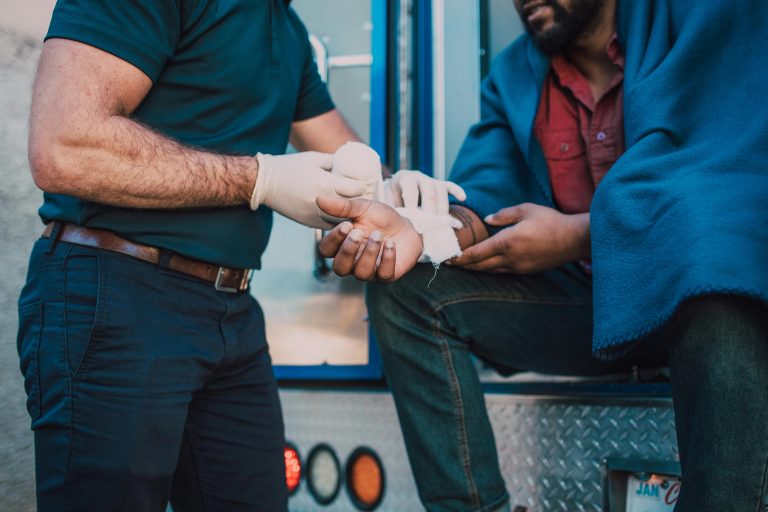Car accidents can be traumatic, both physically and emotionally. In the moments after a crash, adrenaline is high, and your focus is likely on the damage, the police report, and maybe just getting home safely. But once the dust settles, many people make the mistake of ignoring how they feel physically—especially if there’s no obvious pain right away. The truth is, even minor collisions can result in injuries that don’t show up immediately. That’s why early treatment matters more than most people realize.
You might feel lucky walking away from an accident without broken bones or visible bruises. But inside your body, it’s a different story. Injuries from car accidents often take hours or even days to become noticeable. Taking quick action, even if you’re just “a little sore,” can help you avoid long-term issues and ensure a smoother recovery.
Delayed Pain Is Common—and Misleading
One of the most common mistakes people make after a car accident is assuming they’re fine because they don’t feel immediate pain. This is understandable—our bodies are good at hiding discomfort when we’re in shock. The adrenaline rush can mask symptoms, making injuries seem less serious than they really are.
Whiplash, for example, is a soft tissue injury to the neck that often doesn’t cause pain until 24 to 48 hours after the accident. The same goes for back strain, muscle stiffness, and even concussions. Waiting until the pain gets worse can lead to longer healing times and more intensive treatment down the line.
Getting checked right away by a medical professional like one at South Nassau Orthopedic Surgery and Sports Medicine, P.C right away can help detect these injuries early. Patients often seek care for car accident injuries days after their collision—when discomfort becomes impossible to ignore. But by then, recovery may already be more complicated than it needed to be.
Early Treatment Speeds Up Recovery
The sooner you start treatment, the better your chances of healing quickly and fully. Injuries like strained muscles, inflamed joints, or herniated discs respond much better when they’re treated promptly. Early therapy helps prevent the injury from worsening and reduces the chance of long-term complications.
Let’s say you have a neck injury. If you delay treatment, your muscles may begin to tighten or spasm, your range of motion can decrease, and scar tissue may form. But with early physical therapy, chiropractic adjustments, or targeted exercises, you can begin easing pain and regaining mobility much sooner.
Early care also helps with inflammation, which plays a big role in post-accident pain. Left untreated, inflammation can spread and contribute to chronic pain. Tackling it early helps keep your body on the right track for healing.
It Protects You Legally and Financially
Aside from the health benefits, early medical treatment can also protect you in case you need to file an insurance claim or pursue compensation. Whether or not you plan to go the legal route, it’s important to have documentation of your injuries and the care you received.
Insurance companies are quick to question claims where the injured person didn’t seek care right away. Delays can be used to argue that your injury wasn’t serious, or worse—that it wasn’t caused by the accident at all. Getting examined immediately creates a medical record that links your injuries to the accident, making it harder for your claim to be denied.
Additionally, many insurance policies offer coverage for medical treatment after an accident—but only within a certain window of time. Missing that window because you thought you were fine can result in out-of-pocket expenses you weren’t prepared for.
Not All Injuries Are Obvious
While cuts, bruises, or broken bones are easy to see, many injuries that happen in car accidents are hidden. Soft tissue damage—injuries to muscles, tendons, or ligaments—is a common result of sudden impact and sharp movements. These injuries don’t always show up on standard X-rays and can go unnoticed without a thorough physical exam.
Even more concerning, internal injuries or signs of brain trauma can have delayed symptoms. Headaches, dizziness, nausea, or mood changes might appear days after the accident and be brushed off as stress. But they can be signs of something more serious, like a concussion or internal bleeding.
This is why seeing a doctor who specializes in accident injuries is so important. They know what to look for, even if you’re not experiencing obvious symptoms yet. Early detection can be life-saving—not just pain-saving.
You Deserve Peace of Mind
Let’s face it—life after an accident is stressful enough. You’re dealing with insurance companies, car repairs, time off work, and a million other details. But your health should always come first. Taking the time to get checked out early on can bring peace of mind. Either you catch a problem early, or you confirm that your body is in the clear. Either way, you’re not left wondering or worrying.
Too often, people wait until their pain is unbearable before they seek help. By then, what could’ve been a quick recovery might take weeks or even months to fix. Listening to your body—and trusting the signs it’s giving you—isn’t a luxury. It’s a responsibility to yourself.
Conclusion: Don’t Wait—Get Checked
Car accidents can leave more than just dents in your car. Even when the damage doesn’t feel immediate, your body could still be hurting beneath the surface. Early treatment can make the difference between a smooth recovery and long-term discomfort. It’s about protecting your health, your future, and your peace of mind.
If you’ve been in an accident, don’t put off care—even if you feel okay for now. Whether it’s a quick evaluation or a more detailed treatment plan, taking that first step matters. You don’t need to wait for pain to show up before taking action. Your body—and your future—will thank you for it.










